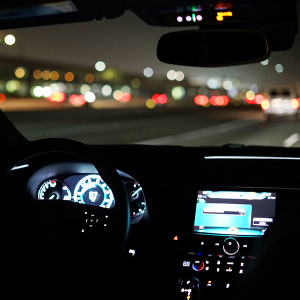Yellow lens glasses are sold with promises to reduce headlight glare from oncoming traffic and help aging individuals see better at night. A new study led by Massachusetts Eye and Ear researchers finds there is no evidence to support these claims and some individuals may even perform worse.
Researchers in the study, which was published in JAMA Ophthalmology, tested 22 people in a driving simulator under different conditions. They found that yellow lens glasses for night driving don’t reduce headlight glare or improve a driver’s ability to detect pedestrians after dark.
“It’s important for people to keep in mind that even if it feels better to drive with yellow lens glasses on at night, our study says it’s not really better for your vision,” says Eli Peli, MSc, OD, an optometrist and senior scientist at Schepens Eye Research Institute of Mass. Eye and Ear. “People think they see better, which may cause them to be less cautious, speed up and drive more dangerously.”
In the driver’s seat
Night driving difficulties may occur from headlight glare and other problems. People who are over 50 years old are especially prone to issues, and companies may be preying on them with their marketing, according to researchers.
The effects of headlight glare in people with cataracts were originally studied by researchers who wanted a closer look at the yellow lens glasses. For quite some time, they have seen these products on the market with little regulatory oversight. Despite a 1997 ruling by the Federal Trade Commission against one company’s claims, the products still remain popular online.
In order to put their doubts to the test, researchers utilized a driving simulator unique to Mass. Eye and Ear. The driving simulator incorporates headlight glare with computerized pedestrians and a real-world steering wheel and dashboard.

Findings from taking the wheel
Initial tests found no differences in driving simulator results between the three pairs of yellow glasses. They also found that the yellow glasses didn’t improve performance compared to the clear glasses.
The authors suspect the glasses might create a false sense of security. People who wear them may perceive their surroundings to be brighter, even though their night vision remains impaired.
“Whether you’re wearing yellow, red, or blue lenses, our research suggests you’re basically wearing sunglasses when driving at night, and they’re not helping you see better,” says study co-author Dr. Alex Hwang, a bioengineering researcher in Dr. Peli’s lab at Mass. Eye and Ear. “Our research raises a lot of questions.”
Better ways to see clearly at night and reduce glare include dimming your dash light, avoiding looking directly at oncoming headlights, using the night setting on the rear view mirror and keeping your windows and mirrors clean. Conditions such as glaucoma and cataracts may also contribute to problems seeing while driving at night. The researchers recommend bringing up any eye concerns at your annual eye exam.
Is there anything that can be done to allow a man in his 80’s with Macular Degeneration to have vision?
Thank you for your informative article. As an elderly person I have wondered about the advisability of purchasing such glasses. Your research confirms what I suspected.
Thank you for reading and commenting, Christine, our researchers appreciate you taking the time!
I used yellow anti-glare glasses that were sold to me at the MEE optical
store and they made a huge difference for my ability to see the road at night when facing glare of oncoming headlights. Without them I was blinded on dark country roads in NH. I have moderate cataracts.
What is the solution you want us to take into consideration. Because during winter season it is more than glare coming from opposite side vehicles, especially from 18 wheelers whose headlight are more powerful than regular cars and are posing severe problem such as total blindness fore few second or for significant time period. Besides avoid night time driving what other option do we have at our disposal so we can be sure, we do not run into accidental situation. Please provide some suggestions if you have for senior citizens who are over 70s, 80s or 90s.
Have not been able to find an outstanding ophthalmologist in NH. I am having problems with my left eye since I had pink eye two years ago but in the past couple of days!.